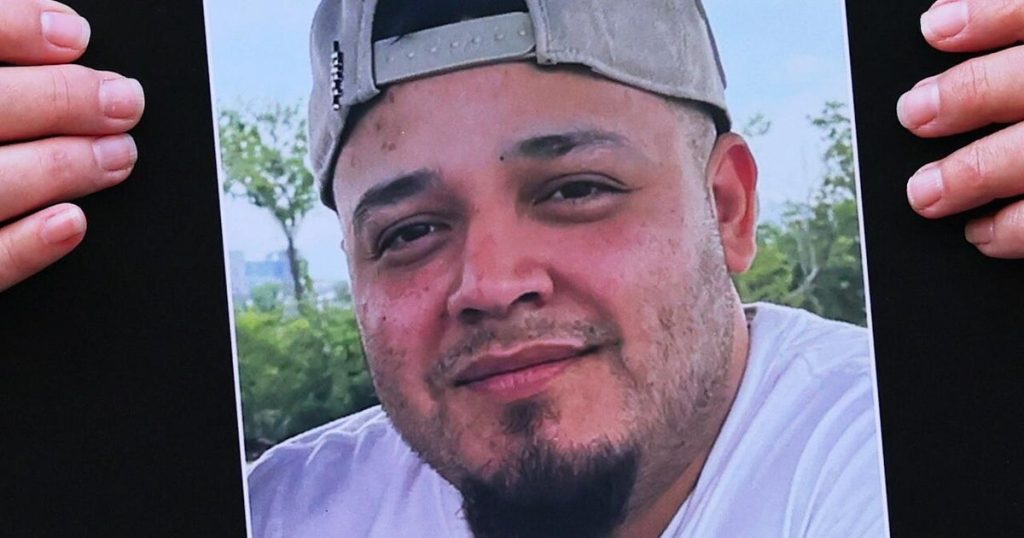A federal magistrate judge has ruled that Kilmar Abrego Garcia, a Salvadoran man deported in error, will remain in federal custody as he faces human smuggling charges in the United States. The decision comes amid concerns regarding conflicting statements from the administration on whether he would be deported following his release. The impending hearing on his case highlights the complexities surrounding immigration and judicial processes amid ongoing discussions about U.S. immigration policies.
| Article Subheadings |
|---|
| 1) Background of the Case |
| 2) Judicial Proceedings |
| 3) Implications of Detention |
| 4) Government’s Position |
| 5) Next Steps and Future Hearings |
Background of the Case
On March 2023, Kilmar Abrego Garcia was mistakenly deported to El Salvador, an error raised significant concerns within legal and immigration circles. His deportation became a central issue in discussions surrounding the Trump administration’s aggressive immigration policies, including mass deportations targeting undocumented immigrants in the U.S. In 2019, Abrego Garcia had been granted legal status, grounding his case in the potential dangers of returning to his native country, where gang violence could threaten his safety. This legal status should have prevented his removal, highlighting the administrative blunders that can have devastating impacts on individuals’ lives.
Judicial Proceedings
After he was deported, a federal judge ordered that Abrego Garcia be returned to the United States. This decision came following a grand jury indictment in late May on two charges of human smuggling. After his return, Abrego Garcia pleaded not guilty to the charges, highlighting the ongoing legal complexities of his case. The magistrate judge, Barbara Holmes, earlier indicated that Abrego Garcia should be granted pretrial release. However, following an appeal by the Justice Department, his circumstances shifted again, with renewed scrutiny on his detention status.
Implications of Detention
Determining whether Abrego Garcia should remain in custody is fraught with implications. The Justice Department argues that he should remain detained to ensure he appears for trial, a point that has ignited discussions about the treatment of individuals within the U.S. immigration and criminal systems. Abrego Garcia’s lawyers have countered these arguments, citing procedural inconsistencies and the potential for deportation to disrupt his right to a fair trial. The situation is further complicated by his status as a legal resident at the time of his deportation, raising significant questions about the rights afforded to him.
Government’s Position
The Justice Department initially sought to keep Abrego Garcia detained, but the situation escalated when the lawyers presented a compelling case for his release. Both sides acknowledged the likelihood that he would face immediate deportation following his release from custody, thereby infringing upon his right to defend himself against the charges. Federal prosecutors did not oppose a delay in his release, seeking stability and clarity concerning the government’s intent to avoid further legal complications. As the lawyers petitioned the court for more time, it became apparent that conflicting statements from the administration added yet another layer of complexity to the matter.
Next Steps and Future Hearings
A critical hearing is planned for July 16, where arguments will be made regarding the government’s request to overturn the magistrate judge’s recommendation for release. The court proceedings will be crucial for determining Abrego Garcia’s immediate future and addressing the instances of contradictory communication from immigration authorities. Judge Holmes indicated that during this period, Abrego Garcia should be separated from other detainees to ensure a reasonable opportunity for consultation with his legal team, a decision underscoring the court’s commitment to due process.
| No. | Key Points |
|---|---|
| 1 | Kilmar Abrego Garcia was mistakenly deported despite having a legal status. |
| 2 | He faces two federal charges of human smuggling. |
| 3 | A key hearing is set for July 16 regarding his detention status. |
| 4 | Conflicting information on deportation procedures complicates the case. |
| 5 | The potential for deportation raises concerns over his rights to legal representation and a fair trial. |
Summary
The case of Kilmar Abrego Garcia underscores critical issues surrounding U.S. immigration policies and the impact of judicial decisions on individual rights. As the legal proceedings unfold, the complexities inherent in his situation highlight the need for clarity and consistency in government communications regarding deportations and legal protections for individuals in similar circumstances. The upcoming hearing on July 16 could serve as a pivotal moment not only for Abrego Garcia’s future but also for broader discussions on immigration enforcement practices in the United States.
Frequently Asked Questions
Question: Why was Kilmar Abrego Garcia deported?
He was mistakenly deported due to an administrative error, despite holding a legal status that should have prevented his removal to El Salvador.
Question: What are the charges against Abrego Garcia?
He faces two federal charges of human smuggling, which he has pleaded not guilty to.
Question: What is the significance of the upcoming hearing on July 16?
The hearing will determine whether the government’s request to revoke the magistrate judge’s order for Abrego Garcia’s release will be granted, impacting his future legal proceedings and potential deportation status.


